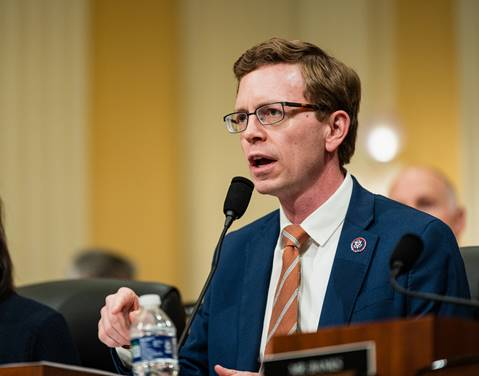
Johnson, Agriculture Trade Caucus Leaders, 24 Members Urge Reduction of Trade Barriers Holding Back Producers
Washington, D.C. – The Co-Chairs of the Agriculture Trade Caucus, United States Representatives Dusty Johnson (R-S.D.), Jimmy Panetta (D-CA), Adrian Smith (R-NE), and Jim Costa (D-CA), led 24 of their colleagues in the House urging the Biden Administration to make agriculture a priority in its trade agenda by reducing tariff and non-tariff barriers for American agricultural exports.

The Members encourage the U.S. Trade Representative (USTR) and the U.S. Department of Agriculture (USDA) to seek enforceable agreements that open markets and reduce existing barriers through bilateral and multilateral engagement. The lawmakers emphasize the need for agreements that lower tariffs, ensure sanitary and phytosanitary (SPS) regulations are science-based, transparent, and consistent, and eliminate the abuse of geographical indicators in the food sector.
“U.S. farmers and ranchers can feed the world, but tariffs and discriminatory barriers aimed at undermining American competitiveness remain a challenge,” the Members wrote. “There is much work to do around the world to expand market access for U.S. producers and raise global sustainability, environmental, labor, and nutrition standards. The Administration should lean into these agreements and demonstrate leadership using all the tools at its disposal, including negotiating agreements that lower tariffs and empower real enforcement.”
The Members conclude, “Maintaining the status quo will only put American agriculture further and further behind as our competitors aggressively pursue such opportunities.”
The recently launched Agriculture Trade Caucus is actively working to advance and promote policies vital to U.S. agriculture, including boosting agricultural exports, facilitating food and agriculture trade, and knocking down unnecessary trade barriers.
Additional signers include Reps. Mike Thompson (CA-04), Glenn “GT” Thompson (PA-15), Josh Harder (CA-09), Don Bacon (NE-02), Don Davis (NC-01), John Duarte (CA-13), Andrea Salinas (OR-06), Mary Miller (IL-15), Elissa Slotkin (MI-07), Mark Alford (MO-04), Dan Kildee (MI-08), Ashley Hinson (IA-02), Kelly Armstrong (ND-AL), Drew Ferguson (GA-03), John Moolenaar (MI-02), Darin LaHood (IL-16), Brad Finstad (MN-01), Doug LaMalfa (CA-01), Michelle Fischbach (MN-07), Randy Feenstra (IA-04), Beth Van Duyne (TX-24), Gregory Murphy, M.D. (NC-03), Jim Baird (IN-04), and Zach Nunn (IA-03).
The full letter can be found here and below.
Dear Ambassador Tai and Secretary Vilsack:
We write to urge the Biden Administration to make agriculture a priority in its trade agenda by reducing tariff and non-tariff barriers for American agricultural exports. U.S. farmers and ranchers can feed the world, but tariffs and discriminatory barriers aimed at undermining American competitiveness remain a challenge. Working together, the U.S. Trade Representative (USTR) and the U.S. Department of Agriculture (USDA) must seek enforceable agreements that open markets and reduce existing barriers through bilateral and multilateral engagement.
Strong U.S. agricultural production outpaces domestic demand, and our farmers and ranchers rely on global markets to sustain prices and revenues. America’s farmers and ranchers lead the world in efficient and sustainable production. However, major tariff and non-tariff barriers continue to impact global competitiveness. Increased U.S. agriculture exports not only sustain an industry crucial to food security and supply chains in the U.S., but also strengthen global sustainability efforts by providing the world with food produced with high environmental and labor standards.
Therefore, we urge the Administration to proactively engage and secure enforceable, high-standard agreements with our trading partners to ensure our farmers and ranchers can compete globally on a level playing field. Specifically, USTR and USDA must work to secure agreements that lower tariffs, ensure sanitary and phytosanitary (SPS) regulations are science-based, transparent, and consistent, and eliminate the abuse of geographical indicators in the food sector.
To that end, we appreciate efforts to enforce our existing agreements and welcome USTR and USDA’s strong use of new enforcement tools available under the U.S.-Mexico-Canada Agreement (USMCA). We appreciate the Administration’s strong efforts on challenging Canada’s dairy tariff-rate quota allocation measures and look forward to continuing to engage. Additionally, we are encouraged to see the Administration’s efforts on engagement of biotechnology. Biotechnology enables our farmers to harvest heartier and more nutritious crops while using less water and fewer pesticides, improving environmental protections. Mexico’s unscientific ban on American-grown corn undermines these advances and could set a dangerous precedent if it is not reversed. We applaud the Administration’s decision to establish a dispute settlement panel regarding Mexico’s unscientific ban and urge USTR to use every tool available under the agreement to ensure Mexico’s compliance with its commitments.
Addressing tariff barriers in Latin America while maintaining high-standard health and safety standards for agricultural imports is also paramount. Brazilian ethanol continues to enjoy duty-free access to U.S. markets and use our biofuels program while American ethanol exports into Brazil face a 16 percent tariff and have no access to Brazil’s biofuel program. This is unacceptable and must be addressed. We are also concerned about the risks associated with allowing fresh beef imports from Brazil and Paraguay without sufficient information and scientific scrutiny. Improving trade relationships with our neighbors in the Western Hemisphere is critical, but we must do so in a way that maintains a level playing field and protects our agricultural industry from unnecessary risk.
As the U.S. seeks further trade engagement in Europe, addressing non-tariff barriers such as SPS regulations, geographical indicators in the food sector, or use of grape varietals names and traditional expressions in the wine sector should be top priorities. The UK has put in place non-science-based bans of U.S. chicken and beef, which target American farmers and ranchers. Discussions with the European Union (EU) should address these issues as well as geographical indicators in the food sector with the sole purpose of keeping American agricultural products out. If the U.S. is not able to address these issues in trade negotiations, it will weaken our negotiating hand around the world.
We reiterate our belief that any agreement that includes binding trade commitments must receive approval from Congress before going into effect. Not only is this required by the Constitution but is essential to the formation of high-standard, durable agreements. To that end, while we are appreciative of the Administration’s focus on the Indo-Pacific Region, we believe more ambition is needed to fully open markets for U.S. agriculture. SPS provisions must be clear and enforceable, and we urge you to also work to modernize customs policies and import licensing regimes. Current policies, for example, prevent perishable fruits and vegetables from entering Indo-Pacific markets in a timely and predictable fashion. Addressing tariffs would provide incentives and leverage to address non-tariff barriers and facilitate enforcement. Many of our competitors benefit from lowered tariffs from bilateral and regional trade agreements like Comprehensive and Progressive Agreement for Trans-Pacific Partnership (CPTPP). By contrast, our farmers and ranchers continue to face onerous tariff rates which stifle market growth. As long as this dynamic remains in place, U.S. producers will continue to lose market share in the region.
There is much work to do around the world to expand market access for U.S. producers and raise global sustainability, environmental, labor, and nutrition standards. The Administration should lean into these agreements and demonstrate leadership using all the tools at its disposal, including negotiating agreements that lower tariffs and empower real enforcement. Maintaining the status quo will only put American agriculture further and further behind as our competitors aggressively pursue such opportunities.
Thank you for your consideration, and we look forward to working with you to support America’s farmers and ranchers and all in the agricultural supply chain who work to feed the world.
###
